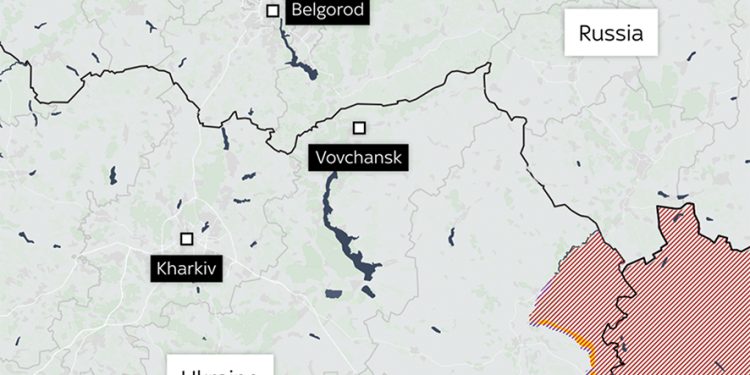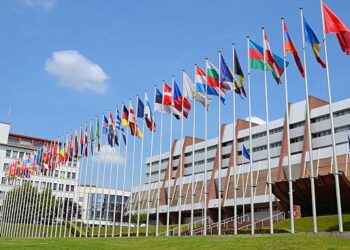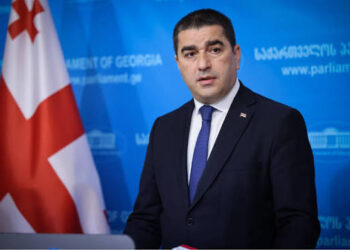It’s been another big week in the conflict, against the background of which world leaders met for a NATO summit and Ukrainian President Volodymyr Zelensky traveled to the UK to attend a European Political Community meeting.
Russia pulled all vessels from Sea of Azov, says Ukraine
Russia has pulled all its vessels out of the Sea of Azov, a body of water connected to the Black Sea, a spokesperson for the Ukrainian navy said.
“There are no longer any Russian naval vessels in the Sea of Azov,” spokesperson Dmytro Pletenchuk said.
Ukraine’s successful attacks on targets in Russian-annexed Crimea and elsewhere in the Black Sea have forced the Russian navy to rebase many of its ships elsewhere.
Russia and China conclude naval drills
Russian and Chinese ships used joint naval exercises in the South China Sea last week to successfully rehearse several combat drills, Russian state media reports.
Russia’s Pacific Fleet was cited as saying that the two navies had carried out about 30 combat exercises, including joint artillery firing at sea, coastal and air targets, and joint search and rescue operations at sea.
The drills, dubbed “Maritime Cooperation 2024,” have now concluded.
China and Russia declared a “no limits” partnership in 2022, when President Vladimir Putin visited Beijing just days before he sent tens of thousands of troops into Ukraine.
Russia’s Kharkiv advance “halted,” Zelensky says
While speaking at the European Political Community Summit, President Zelensky said Ukraine had “halted Moscow’s forces completely” in Kharkiv.
The Ukrainian president made the comment while trying to convince leaders to help with Kyiv’s air defense capability.
“We have stopped the Russian advance on Kharkiv – period,” he said.
“Putin has sacrificed tens of thousands of his citizens, but has achieved nothing significant,” he added.
Yet Russian state media this week reported that Russian troops had captured two settlements in Ukraine: The village of Rozivka, in Ukraine’s eastern Luhansk region, and Pishchane Nizhne in the northeastern Kharkiv region.
TASS news agency said both villages were captured in one day.
It quoted the Russian defense ministry as saying: “As a result of successful actions, units of the West group of troops liberated the settlements of Rozivka in the Luhansk People’s Republic and Pishchane Nizhne in the Kharkiv region, and also occupied more advantageous lines and positions.”
Further, Russia’s latest attack on civilians in Ukraine struck the office of a Swiss mine-clearing NGO, killing at least three people in city of Kharkiv.
The attack injured six others and damaged the office of Fondation Suisse De Déminage, the local governor said. Rescue operations continued into the night.
Kharkiv has been one of Russia’s targets since the early days of the war, but the region became more of a focal point in May when Moscow’s forces launched a cross-border incursion.
Six people injured in attacks on Kherson
Six people have been injured in a range of attacks on Kherson, Ukrainian officials say.
In a post on Telegram, Ukraine’s National Police said Moscow’s troops had shelled the southern region with artillery, mortars, tanks and drones.
Two people, a 51-year-old woman and 70-year-old man, suffered “mine explosive injuries,” it said.
Two others, aged 56 and 74, were injured in the street when ammunition was dropped from a drone, it added.
Another two people “came under artillery fire”.
Russia pursuing tactical gains despite ‘significant manpower losses’, says Ukrainian army chief
Ukrainian commander-in-chief Colonel General Oleksandr Syrskyi says Russia has significantly increased its manpower and materiel commitments to the war in Ukraine since February 2022, and has suffered “significant manpower losses”.
Active fighting is ongoing along 977km of the 3,700-km-long frontline, General Syrskyi told The Guardian, adding that Russia’s military command continues to pursue tactical gains regardless of the losses involved.
On the other side, Ukrainian forces are attempting to safeguard the lives of Ukrainian troops, he said.
The US-based think tank monitoring the war, the Institute for the Study of War, said the army chief’s statement is “not indicative of a sudden increase in the Russian military’s presence in Ukraine and is instead representative of the manpower and materiel disadvantage that Ukrainian forces have faced for over two years”.
It added: “Russia’s ability to continue gradually expanding the amount of manpower and materiel it has committed to Ukraine faces significant constraints in the medium to long term.”
Vladimir Putin’s forces have “extensively relied on refurbishing stocks of Soviet-era weapons and military equipment to sustain the tempo of its offensive operations in Ukraine in order to avoid fully mobilising the Russian economy and society to a war-time footing,” the ISW said.
“Ukrainian authorities have noted that Russia is currently not producing enough to cover its current equipment losses in Ukraine,” it said.
Zelensky facing ‘very difficult’ time and risks ‘political suicide,’ says Klitschko
Volodymyr Zelensky will face a “very difficult” time over the coming months, the Mayor of Kyiv has warned.
Speaking to Italian news outlet Corriere della Sera, Vitaliy Klitschko said the Ukrainian president will have to make hard decisions that could lead to “political suicide.”
He warned that Mr Zelensky may have to launch a referendum in Ukraine if a territorial compromise with Russia is put on the table.
“The coming months will be very difficult for Volodymyr Zelensky,” he said.
“Will he have to continue the war with new deaths and destruction, or consider the possibility of a territorial compromise with Putin?”
“Whatever move he makes, our president risks political suicide. Let’s be honest, we have to win the war, but the situation is getting more and more difficult. It depends on the help that comes from the allies. It would be a nightmare if we had to fight for two more years.”
Compiled by Ana Dumbadze














